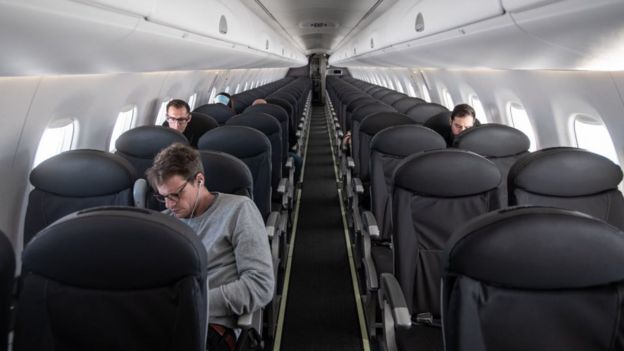
This article is more than
5 year old
Virgin Atlantic will cut four-fifths of its flights and has asked staff to take eight weeks of unpaid leave.
Ryanair and EasyJet are grounding most of their fleets, while BA owner IAG is to cut capacity by 75%.
Norwegian Air has cancelled thousands of flights and will temporarily lay off more than 7,500 staff.
Holiday company Tui has said it will suspend the "majority" of its operations, affecting "package travel, cruises and hotel" bookings.
Passenger numbers and bookings have plummeted in recent weeks as countries closed their borders and holiday makers cancelled trips.
Forecasts by the research firm Centre for Aviation now predict that most airlines in the world will be bankrupt by the end of May unless they receive financial support.
"Coordinated government and industry action is needed - now - if catastrophe is to be avoided," the firm said in a statement. "Demand is drying up in ways that are completely unprecedented. Normality is not yet on the horizon."
In the US, airlines are in talks with the government about rescue funding, after announcing dramatic cuts to flight schedules and other measures. They are seeking up to $50bn in aid, according to the Wall Street Journal.
In the UK, Virgin Atlantic has asked the government for support for the sector, including emergency credit of up to £7.5bn.
EasyJet Chief Executive Johan Lundgren also called for government intervention to support the aviation industry. "European aviation faces a precarious future and it is clear that co-ordinated government backing will be required to ensure the industry survives and is able to continue to operate when the crisis is over," he said.
Virgin said that it was going to reduce its services to focus on "core routes". Its London Heathrow-Newark route will be cut immediately.
The airline will also ask staff to take eight weeks unpaid leave over the next three months, with the cost spread over six months' salary.
Virgin said it was doing this to avoid job losses, although it is also offering a voluntary redundancy package to all employees.
Norwegian Air's temporary reduction in staff numbers will affect pilots, cabin crew and maintenance workers, roughly equalling 90% of its workforce.

Over the weekend, Scandinavian airline SAS said it would temporarily halt most of its flights until conditions for commercial aviation improved.
As a result, the airline said it would temporarily lay off up to 10,000 employees, or 90% of its workforce.
IAG, which owns British Airways, Iberia and Aer Lingus, said it had suspended flights to China, reduced capacity on Asian routes, cancelled all flights to, from and within Italy as well as making other changes to its network.
"There is no cash whatsoever coming in the doors," said aviation analyst John Strickland, who warned that airlines could lose money very quickly, despite such drastic measures.
Mr Strickland described the reduction in airlines' operations as "stunning", warning that airlines can lose money "very, very quickly".
Stemming the loss by cancelling flights and parking aircraft is one thing, he said, "but airlines are both capital and labour intensive so there has to be support of the costs that cannot be avoided even if an airline is grounded".
Willie Walsh, chief executive of IAG, said he expects demand to remain weak well into the summer. BA's boss sent a memo to staff last week questioning the airline's survival if it did not make urgent changes.
EasyJet said it had cancelled a "further significant" number of flights. "These actions will continue on a rolling basis for the foreseeable future and could result in the grounding of the majority of the EasyJet fleet," it said.
Mass cancellations of flights in an unprecedented situation may leave passengers unsure of their rights.
For those yet to fly out, it is relatively straightforward - you should be given a refund or, in some cases, the option to rebook for another date.
If this is part of a package holiday, then the entire cost of the holiday will be refunded. A separate hotel booking will require a call to the hotel, asking for leeway, or perhaps a travel insurance claim if the policy covers you.
For those trying to get home, an airline has a duty of care to get you back if they have cancelled your flight. This may mean flying with another airline or putting you on a different mode of transport. If an extra overnight stay is required, the airline should pay for that as well as the food you need.
However, for those who accept a refund for a cancelled return flight, the airline's duty of care ends at that point. You would then have to get yourself home, which could be difficult given the current restrictions.
Consumer organisation Which? has called on airlines and holiday firms to give clear, fast advice to customers as the situation changes.